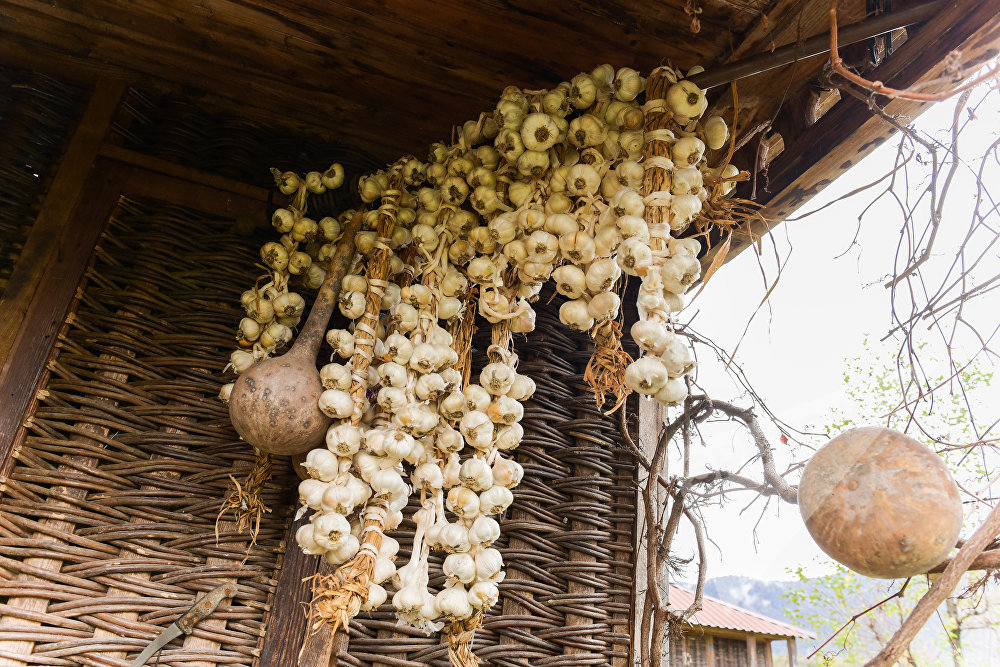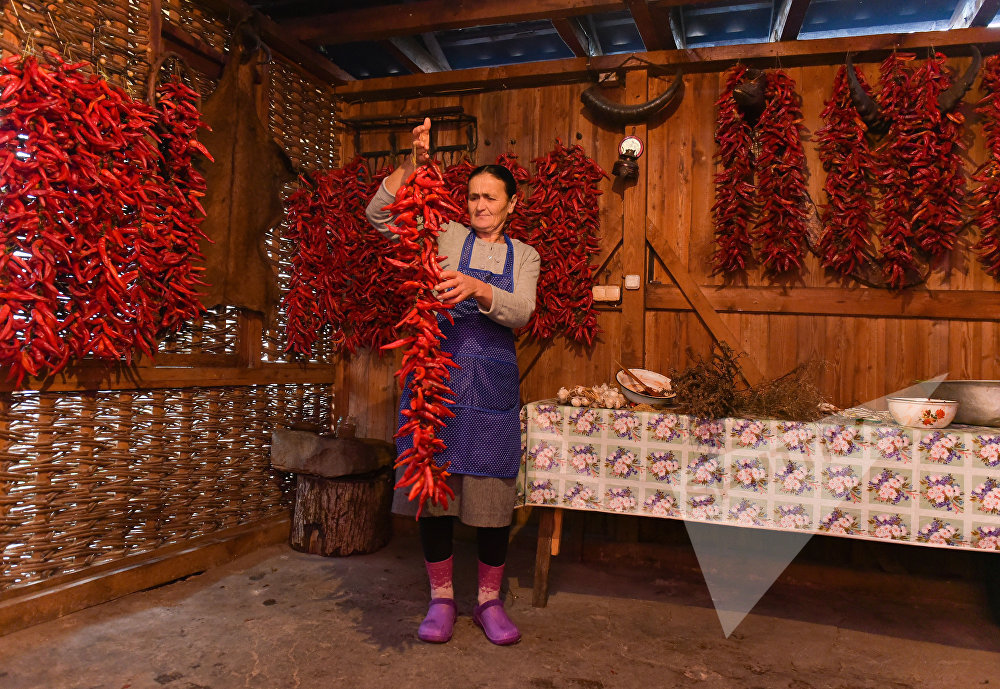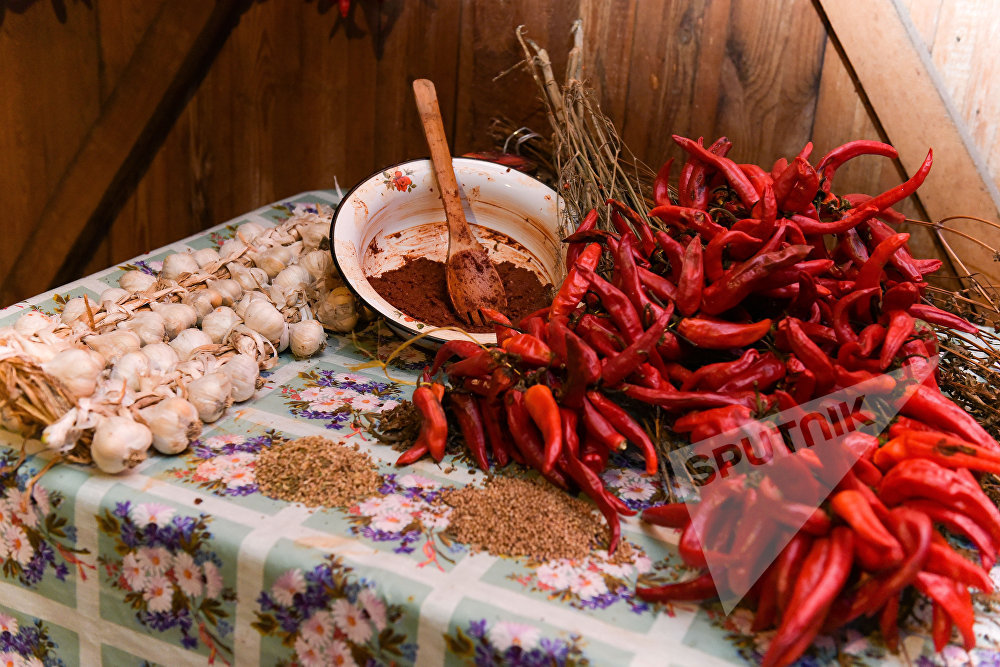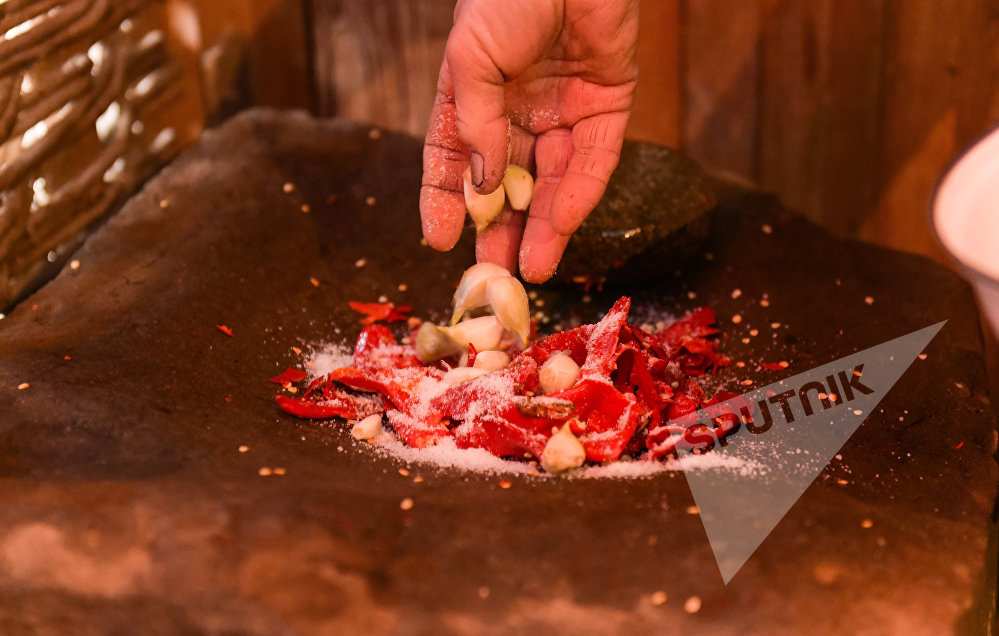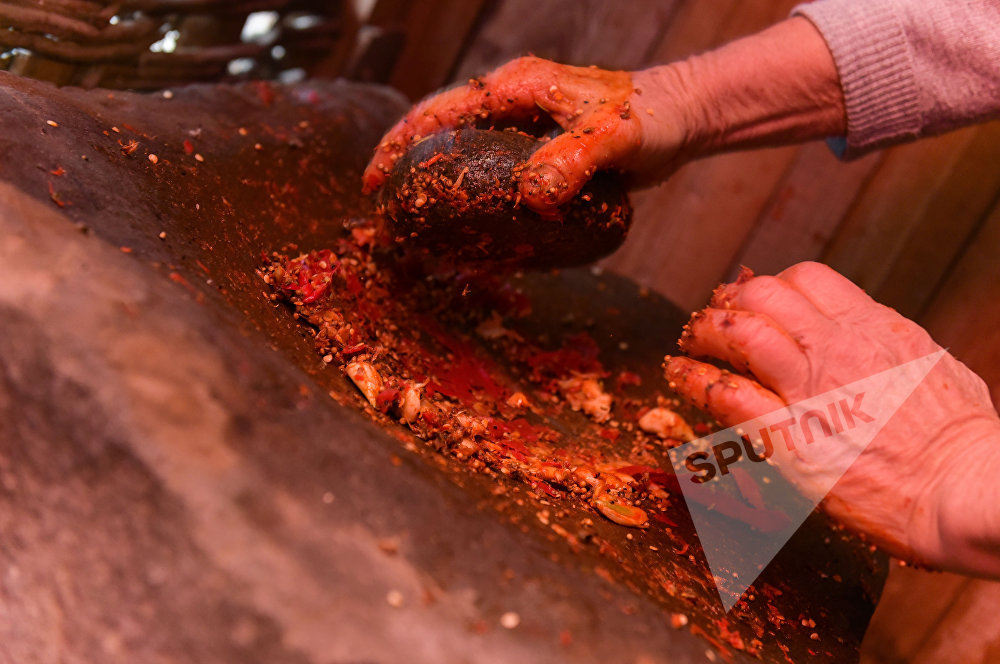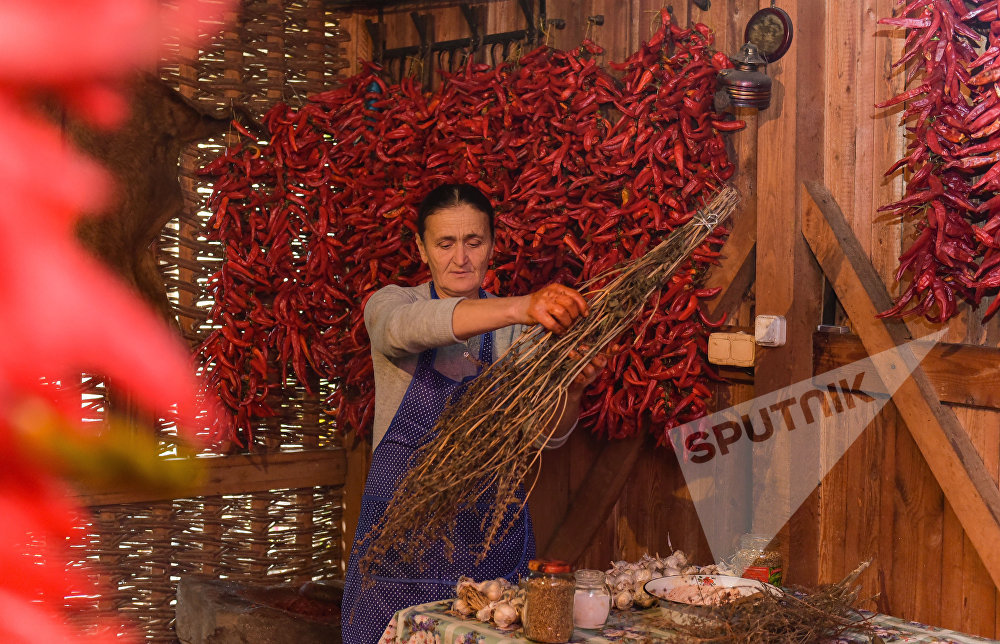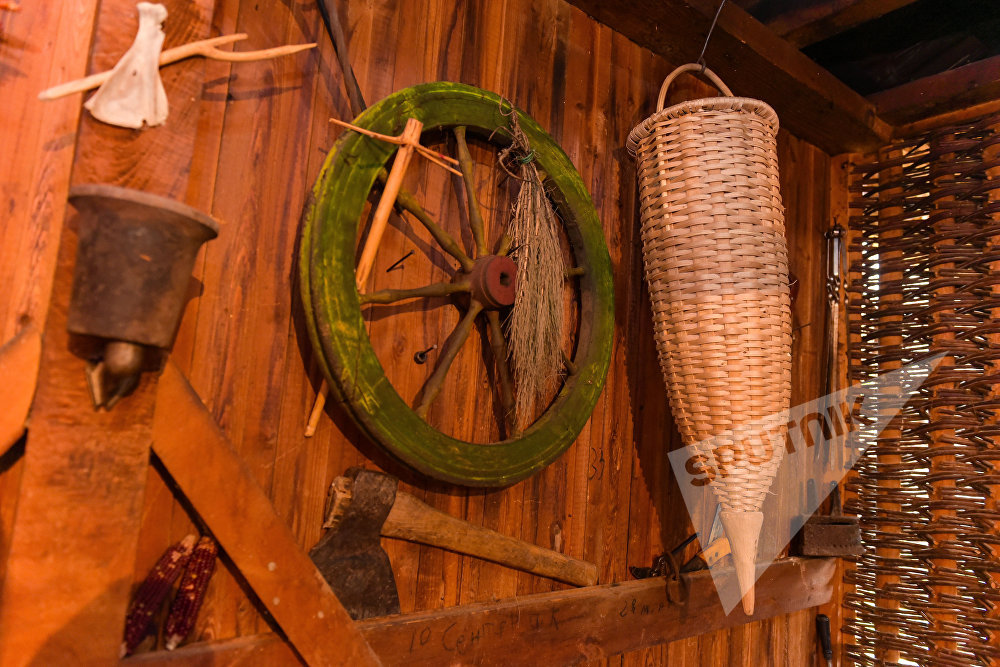Pepper and Stone: how to 'produce' Abkhazian ajika

Alla Sabua-Chichba, resident of the village of Achandara preparing Ajika. Ajika in translation from Abkhaz means ‘salt’.
The secrets of the ancient method of preparing the Abkhazian national seasoning known as ajika [adjika or adzhika; Abkhaz: аџьыка] and the transformation of hot pepper and spices on stone into a unique, fragrant and piquant ‘masterpiece’ were revealed to a correspondent of Sputnik by Alla Sabua-Chichba, resident of the village of Achandara.
Sputnik Abkhazia: Rada Azhiba.
In olden days, the Abkhazians prepared ajika on a special stone: large, flat, and of quadrangular or round shape. The stone is called ahaqj’a (the mortar), and all ingredients are ground to a mass of plasticine-like consistency with another oblong stone called apkhnyga (the pestle).
The stone (ahaqj’a), which is about two hundred years old
Before the invention of comfortable household-appliances, which greatly facilitated the life of housewives, grasses and spices were ground with the stone pestle on the mortar to produce ajika . Many residents of Abkhazia still, albeit infrequently, use a stone ahaqj’a to prepare their ajika . A resident of the village of Achandara, Alla Sabua-Chichba, in autumn takes her heavy stone from the basement, washes it, dries it in the sun and begins to grind pepper with garlic and herbs.
"In the modern world, there are many options for preparing ajika, but ajika prepared on a stone-mortar is simply incomparable." Ajika ground on stones has different taste-qualities from ajika passed through a meat-grinder. Our ajika is a cure for a thousand ailments Many people say that one cannot eat a lot of piquant ajika ; personally, I'm sure that one can eat a lot of ajika that has been ground on stones." Thus did Alla begin her story about the old way of preparing ajika .
The stone-mortar which she uses belonged to her mother-in-law, who in turn inherited it from her mother. The hostess proudly notes that her stone-mortar is about two hundred years old.
"My mother-in-law often used to prepare ajika , and, of course, she ground it on the stone; she did not recognise the meat-grinder until the end. I was left my ahaqj’a by my mother-in-law; she was left it by her mother, and I shall leave it to my daughters-in-law. Several times I was told: ‘This stone is our entire apsuara (the moral and ethical code of the Abkhazians - ed.).’ You probably know that in the olden days such stones were found in special places, even at the bottom of rivers, and not all women used them," said the mistress of the house.
Alla Sabua-Chichba prepared ajika for the first time on an ahaqj’a under the watchful eye of her mother, and it was after her marriage that her mother-in-law introduced her to the intricacies and secrets of the traditional method of preparation. "Maybe I'm not making it as delicious as my mother and mother-in-law did," says Alla Sabua-Chichba, "but I try to do everything as I saw with my own eyes and was taught by the elders. Under modern domestic conditions, the observance of all the subtleties of ancient technology is complicated.”
Ajika is only peppers
Traditional ajika is different from many modern variations. Abkhazian ajika does not contain tomatoes, mushrooms, or marrows. They prepare it exclusively from hot red peppers dried in the sun. Less often ajika is made from unripe green peppers.
Abkhazians sow pepper-seeds to have seedlings ready in March and then transplant the shoots in early May. The fruits of the chilli-pepper redden in late summer. According to Alla Sabua-Chichba, in one season she produces more than 300 bundles of pepper.
"When the pepper pods turn red, I harvest the first crop. I string the peppers on a strong thread and make pepper-sheaves to a length of a metre and a half. In a season I make more than 300 sheaves. The peppers must be hung to dry on the porch of an apatskha [traditional Abkhazian dwelling of plaited wickerwork – ed.], and then in the smoke of the hearth. The smoke of a fireplace cures the hot pepper, and it gains its special colour," was the secret she shared.
Like butter
There are many recipes for ajika , but the fundamentals always stay the same: pepper, salt, garlic, spices. Before grinding on the stone, the pedicels are removed from the pepper-pods. Alla Sabua-Chichba says that many soak their peppers before grinding and extract the seeds.
"I do not do this. I leave the seeds to add piquancy," she explains.
The process of preparing this Abkhazian ajika requires a long and careful grinding of the ingredients on the stone, in the centre of which there is a depression.
"I place the peppers in the cavity of the ahaqj’a and add the salt, as the salt grinds the pepper between the stones. I add the spices and garlic later, and then I take hold of the oblong stone (apkhnyga) with my right hand, pressing on top with the left in motion over the bottom stone (ahaqj’a), and begin to grind the pepper carefully. The mass resulting from the lengthy action of grinding takes on a unique and viscous character. The essential oils which exude from the spicy herbs, garlic and pepper during grinding give its incomparable aroma to the ajika ," said Alla in describing the process of creating the aromatic ‘miracle’.
The hostess from Achandara advises newcomers to work in rubber gloves, since it is better not to touch hot peppers with bare hands. Ajika, cooked according to the ancient method, has a very delicate consistency, which is comparable with butter.
Abkhazian legend about ajika
Ajika [adzhika - аџьыка] in translation from Abkhaz means ‘salt’. There is a legend that in the olden days the owners of sheep, driving flocks to the mountains, gave the shepherds salt for the sheep. The salt increased the animals’ appetite; they began to consume more food and water and therefore gained weight well. Salt was then very expensive and could not be afforded by simple shepherds, and so, to prevent theft, pepper was mixed with it. But resourceful shepherds began to add fragrant herbs and spices to the mixture; they ground everything on a stone and used it as a seasoning. Ajika -tsw’atsw’a in Abkhaz is used to refer specifically to the seasoning described here and to distinguish this from ordinary ‘white’ salt.
Lovers of the aromatic ajika add it to any food, especially when cooking dishes of the national cuisine.
****
Ajika [Adjika or adzhika] is an Abkhazian spicy seasoning, a paste-like mass of pepper, herbs, garlic and salt, which is known all over the world. In the olden days, the Abkhazians adjika was cooked on a special stone called ahaqj’a.
There are many recipes for ajika , but the fundamentals always stay the same: pepper, salt, garlic, spices. Before grinding on the stone, the pedicels are removed from the pepper-pods. Alla Sabua-Chichba says that many soak their peppers before grinding and extract the seeds, but she does not do this:
"I place the pepper in the cavity of the ahaqj’a and add the salt, as the salt grinds the pepper between the stones. I add the spices and garlic later, and then I take hold of the oblong stone (apkhnyga) with my right hand, pressing on top with the left, passing over the bottom stone (ahaqj’a), and begin to grind the pepper carefully. The mass resulting from the lengthy action of grinding takes on a unique and viscous character. The essential oils which exude from the spicy herbs, garlic and pepper during grinding give an incomparable aroma to the ajika ," said Alla in describing the process of creating the aromatic ‘miracle’.
Traditional ajika is different from many modern interpretations. Abkhazian ajika does not contain tomatoes, mushrooms, or marrows. They prepare it exclusively from hot red peppers.
This article was published by Sputnik Abkhazia and is translated from Russian.
+ Ajika Abkhazian in the UK www.ajika.co.uk
+ Adjika: Sauce of Glory, Pride of Abkhazia, by Oliver Bullough
+ Spicy Sauce Proves To Be Recipe For Success
+ Abkhazian Cuisine

